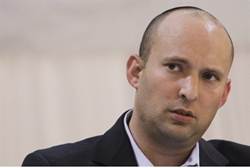 |
| Netanyahu – warmonger Prime Minister casts his vote |
Old Wine in New Zionist Bottles
In the article I wrote 4 years ago, after the 2009 Israeli elections, I said that the 2 State solution was dead as a door mouse. Today membership of the Flat Earth society is a more rational choice than support for 2 States.
Anyone who thinks that the latest Israeli elections will give a boost to the ‘Peace Process’ has substituted hope for reality. In fact what was remarkable about the election was the absence of any discussion about the occupation of the West Bank and Gaza. Shelly Yachimovitch, leader of Israel’s Labour Party, steadfastly refused to discuss the issue, preferring instead to concentrate on bread and butter issues. Yair Lapid, leader of Yesh Atid, the new Centre Party, was equally reluctant to discuss the Occupied Territories. The Right of course didn’t need to discuss the Occupation (though they did) and the new far-right party Jewish Home, led by Naftali Bennett, appears to have gained 12 seats.
At the time of writing, the election results are still changing, but the trends are clear.
1. In the Arab sector, the 3 Arab parties – United Arab List, Balad and Hadash (Communist) are set to gain 10 seats again. Although there are reports of a last minute increase, Israeli Arabs were expected to abstain in record numbers.
2. The Zionist ‘left’, which plumbed the depths of unpopularity in the 2009 elections, gaining just 16 seats (compared to 65 in 1949 and 56 as late as 1992) has recovered to a minor extent. Meretz (formerly Mapam and Ratz) and the Labour Alignment, according to exit polls, are expected to gain 22 seats, two less than they held in 2006. Meretz in particular, which no longer links with a kibbutz federation, has doubled its seats from 3 to 6, the same number as a decade ago but still half the number of seats they gained in 1992.
3. The ‘big talking point’ is however the rise from nowhere of Yair Lapid’s Yesh Atid, a ‘centrist’ secular party, which is estimated to have gained 18 seats. Unfortunately people have short memories. When Menachem Begin was elected to government in 1977, he formed a coalition with Yigal Yadin’s Democratic Movement for Change which gained 15 seats. In 2003 Shinui, a secular free market party, which later merged into Meretz, also gained 15 seats. By the 2006 elections it had disappeared. It was even lead by Yair’s father Tommy Lapid! In case people have forgotten there was another ‘centrist’ party, Kadimah, formed in November 2005 by Ariel Sharon and former members of Likud, though former Labour leader and the current President, Shimon Peres, also joined it, winning 26 seats in 2006. In 2009 under Tsipi Livni, the former Foreign Minister, it became the largest party in the 2009 elections with 28 seats. Described by Wikipedia as a ‘a centrist and liberal’ party http://en.wikipedia.org/wiki/Kadima Kadimah, under Shaul Mofaz, on the latest projections won’t gain any seats!
Israel’s many ‘centrist’ parties were and are, in any normal western democracy, election lists led by a personality, in this case a prominent former journalist Lapid. They have no real membership or internal life except at elections. They represent the hope of Israeli electors who, wish to enjoy the spoils of colonisation without paying the price. They hope to square the circle between a Jewish state and a Democratic state. In reality, as Kadimah demonstrated, they consistently choose the former. Livni, as the Palestine Papers (Clayton Swisher) proved (part of the series of leaks of State department files), consistently advocated in the negotiations with Saeb Erekat of the Palestine Authority, the transfer of Israel’s Palestinian population into a Palestinian state.
Almost without exception these ‘centrist’ parties, whose only distinguishing feature was a watered down secularism, but who consistently lost out to the Orthodox parties over questions such as civil marriage and the role of the rabbis in personal affairs, have split into fragments which have disappeared by the next election. If there is one prediction that I can confidently make, it is that Yesh Atid will fragment and barely exist (if at all) in the next elections in 2017.
 |
| Naftali Bennett of the hard-line settler party, Jewish Home |
Netanyahu’s Likud-Beteinu, a merger with Avigdor Lieberman’s party, (Lieberman himself is currently expected to be charged with corruption by the Police) will be on current projections gain 33 seats, a loss of 10 seats. But the elections have also seen the rise of Jewish Home, an increase of 5 seats for the old Jewish Home and National Union. Shas, the Sephardic/Misrahi religious party, is also expected to gain one seat, so the ‘right’ in the Israeli elections have suffered at most a loss of about 5 seats.
But the terms’ ‘left’ and ‘right’ are almost meaningless. Kadima supported most of the racist legislation of the current Netanyahu government – Boycott, Loyalty oaths, outlawing of Nakba commemoration, legalisation of the JNF practice of only leasing housing to Jewish citizens. The fact that Tsipi Livni’s new Hatnuah party, with 7 seats, is termed part of the Israeli ‘left’ shows just how far Israeli politics have moved to the right.
Shelly Yachimovich, Labour’s leader, was once seen as a radical. Today however she goes out of her way to emphasise that the settlers are not her enemy. In 2011 she argued that the tent protests against the high cost of housing and the decline of Israel’s welfare state, even for Jews, should not take a position on the settlements or the position of Arabs in Israeli society or campaign around ending money for new settlements and using it to build housing in pre-1967 Israel. But Yachimovich is only living up to the tradition of the Israeli Labour Party, which first pioneered the settlements and historically was the party that expelled the Palestinians in 1948. The Israeli Labour Party was the party of Jewish Labour (i.e. no Arab Labour – pre-1948 Israel’s equivalent of the colour bar). It merged the apartheid structures of pre-48 Zionism, the Jewish National Fund and the Jewish Agency, into the operations of the government, in order to provide the cover for state discrimination. Even Meretz, the left-Zionist party, is based on Mapam, which historically talked left whilst being part of the Kibbutz Artzi Federation that was established on confiscated and razed Arab villages. Its members took part eagerly in the activities of Palmach, the Zionist shock troops, who carried out many of the expulsions and massacres.
Those who believe that the current Israeli elections herald any sort of change will be sadly disappointed. It is a rule of Zionist politics that no government coalition should depend on the votes of the Arab parties. In reality this means that the Zionist ‘right’ will continue to dominate the Knesset and it is likely, despite their promises to the contrary, that both Labour and Yesh Atid will be attracted by the possibility of being in government, given that the United States will want the fig-leaf of ‘2 States’ to continue for another four years.
Below is an updated table showing the decline of the Zionist ‘left’ since the first election in 1949.
Tony Greenstein


Large parts of your analysis were factually correct and this post was, as usual, well written.
I would only make the obvious point that while many overseas observers are sure that the only issue that ought to be concerning Israeli politics are the future of Judea and Samaria, in fact it is the "bread and butter" issues that are upper-most in most of our minds, especially at a time when there seems little prospect of progress in the "Peace Process".
I usually vote Lieberman, but voted Bennet this time after I thought he was being unfairly attacked by the Likud. Incidentally, you may want to examine Bennet's plan to annex area C and give full citizenship to the Palestinians living there.
https://www.youtube.com/watch?v=BeHT9TlrARc
I think it's called the 'piss process' in Israel. No one takes it seriously but the bread and butter issues, despite the attempts of Shelly Yachimovich and Lapid to ignore the Territories, they cannot do so indefinitely as they are bound up with the future of those territories.
You will understand why Bennet for me holds no attractions! He advocates outright annexation but if he wishes Palestinians in Area C full citizenship (which doesn't of course amount to a great deal where Arabs are concerned) then presumably he is happy to accept that the Israeli state is an apartheid state since he is opposed to even a dressed-up bantustan for the rest of the West Bank
2 states however has gone and Israel, whether it likes it or not, is going to have to confront the question of whether it is a Jewish or a Democratic state. It cannot be both. Therein lies the dilemma because once it is accepted that Israel is an apartheid state, its political support in the West will begin to dry up and only strategic interests will be the reason for continuing to give it support.
In the long term and even the medium term that will not be enough.
What nonsense! We talk in Hebrew here and the pun really doesn't translate. It sounds more like Peres' awful English pronunciation.
Have a great week!